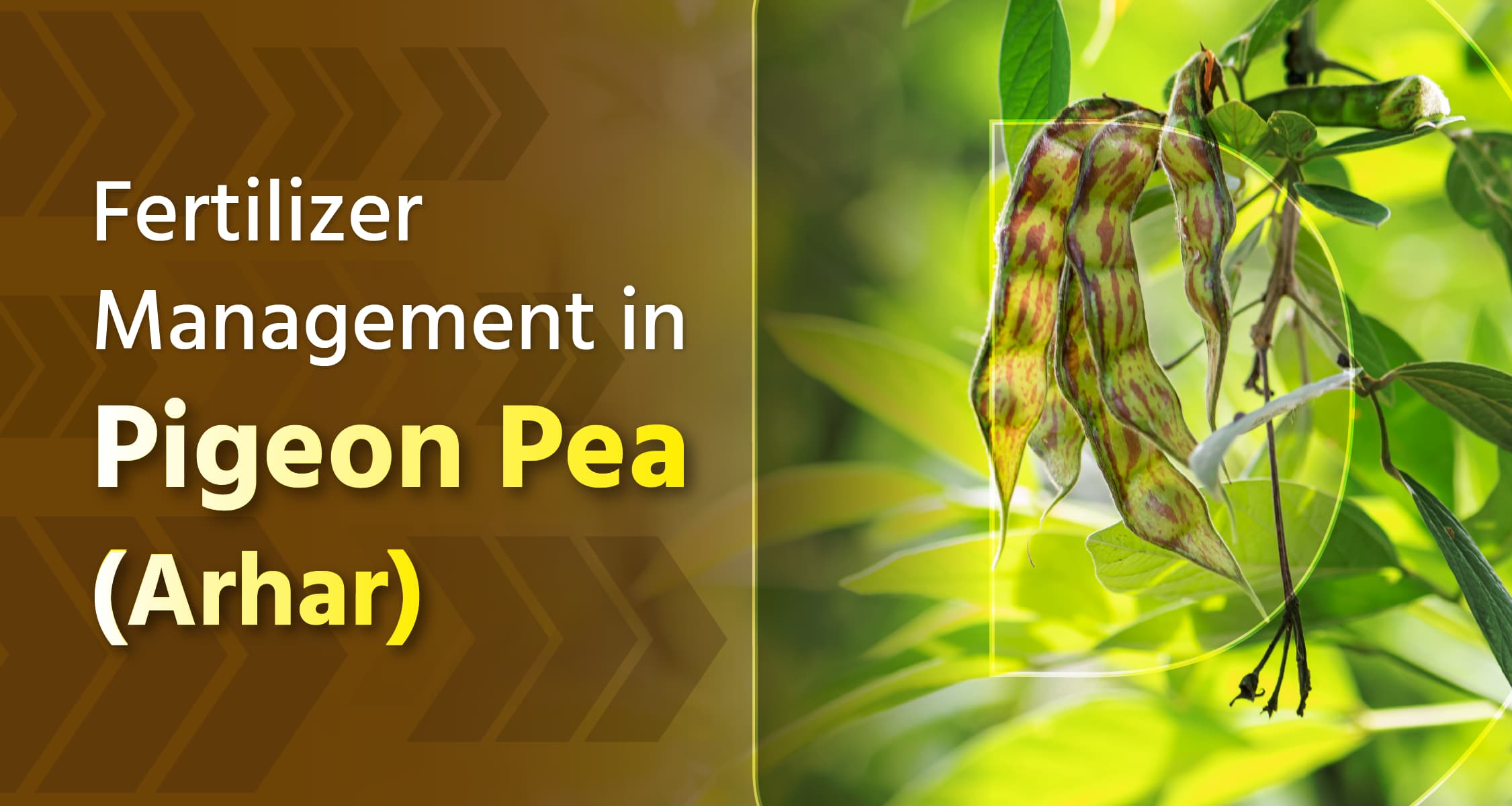Fertilizer Management in Pigeon Peas (Arhar)

Pigeon pea is a major pulse crop. World's 85% of pigeon pea production is done in India. To achieve a better yield, it is very important to execute proper fertilizer usage. The requirement for nitrogen in pigeon pea crops is less compared to other crops. By using compost manure in the fields before sowing pigeon peas, we can obtain high-quality crops. For elaborate information on fertilizer management in pigeon pea crops, please go through this post carefully.
Benefits of Using Fertilizers in Pigeon Pea (Arhar) Crop
- Increase in Yield: Proper use and management of fertilizers can significantly increase the yield of pigeon pea crops.
- Better Quality: Fertilizers help improve the quality of pigeon pea crops by increasing protein content.
- Balanced Nutrition: The use of fertilizers provides crops with all the essential nutrients. Thus, fertilizers help in providing balanced nutrition to the crops, aiding in plant development.
- Improved Root Development: Fertilizers can enhance root development, helping the crop absorb water and nutrients more efficiently.
- Increased Disease Resistance: By addressing nutrient deficiencies, fertilizers make plants healthier and increase their resistance to diseases, reducing the likelihood of pest and disease outbreaks.
- Stress Resistance: Fertilizers can help pigeon pea crops withstand stress caused by drought or excessive rainfall.
- Cost-Effective: Proper use of fertilizers can be cost-effective in the long run, as it can increase both the yield and quality of the crop, resulting in higher profits for farmers.
- Sustainable Agriculture: Fertilizers can be used as part of sustainable agricultural practices, helping maintain soil fertility and reducing the need for chemical pesticides.
Fertilizer Management While Preparing the Field
- To achieve better yields, use well-decomposed cow dung manure and 5 to 6 tons of green manure per acre in the field.
- Use 8 to 10 kg of urea, 24 to 25 kg of single super phosphate, and 16 to 18 kg of muriate of potash per acre in the field.
- While preparing the field, use 4 kg of DeHaat Starter per acre.
- If the soil in the field is deficient in zinc and sulfur, use 5 kg of zinc sulfate (DeHaat Nutri One Zinc Sulfate Monohydrate) per acre.
Factors to Consider While Using Fertilizers for Crops
- Soil Testing: Before using fertilizers, it is important to test the soil to know the nutrient content and pH levels. This can help farmers determine the appropriate type and amount of fertilizer to use.
- Application Timing: Fertilizers should be applied at the right time based on the crop and its growth stage. Hence it is important to know, how often to apply fertilizers. Using fertilizers too early or too late can reduce their effectiveness.
- Correct Usage: Fertilizers should be mixed evenly and at the correct depth to ensure they reach the plant roots. It is important to pay attention to the quantity used, as applying too little or too much fertilizer can negatively impact crop yield.
- Environmental Factors: Environmental factors like rainfall, temperature, and soil moisture can affect the effectiveness of fertilizers. It is important to consider these factors when applying fertilizers.
- Safety Precautions : Fertilizers can be hazardous if not handled properly. Farmers should follow safety precautions such as wearing protective clothing and avoiding contact with skin and eyes.
Effects of Excessive Use of Fertilizers
- Soil Degradation: Excessive use of fertilizers can lead to soil degradation, which over time can reduce soil fertility and productivity.
- Water Pollution: Fertilizers can seep into groundwater and surface water, causing water pollution. This can harm aquatic life and make water unsafe for human consumption.
- Air Pollution: Fertilizers can release harmful gases into the air, contributing to air pollution and climate change.
- Harmful to Health: Excessive use of fertilizers can lead to the accumulation of harmful chemicals in crops. Consuming such crops can be detrimental to the health of humans and animals.
- Increasing Costs: Overuse of fertilizers can gradually reduce soil fertility. To achieve better production and maintain soil fertility, more fertilizers need to be purchased, increasing production costs for farmers.
- Reduction in Biodiversity: Excessive use of fertilizers can reduce biodiversity, as it can harm beneficial microorganisms and insects that play a crucial role in maintaining soil health.
Have you ever tried soil testing before using fertilizers on your pigeon pea (arhar) crop? Share your answers and experiences with us in the comments below. For more information related to agriculture, follow the 'Krishi Gyan' channel now. Also, don't forget to like this post and share it with other farmers.
Frequently Asked Questions (FAQs)
Q: Which fertilizer should be used for pigeon peas (arhar)?
A: To achieve higher yields of pigeon peas, use cow dung manure along with urea, single super phosphate, and muriate of potash. In areas deficient in zinc and sulfur, use zinc sulfate.
Q: When should water be given to the pigeon pea crop?
A: The pigeon pea crop should be watered at regular intervals. In India, the crop is typically grown during the monsoon season, and rainfall is the primary water source. However, for good yields, irrigate the crop when the top 5-10 cm of soil dries out. The frequency and amount of irrigation depend on soil type, weather conditions, and the crop's growth stage.
Q: How can we achieve higher yields of pigeon peas?
A: To achieve higher yields of pigeon peas, it is essential to select high-yielding varieties, prepare the land properly, sow on time, and manage nutrients appropriately. Additionally, controlling diseases and pests and keeping the field free of weeds can also lead to better yields. The yield of pigeon peas also depends on natural factors like temperature and humidity.
Please login to continue

Get free advice from a crop doctor
